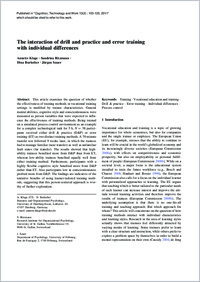The interaction of drill and practice and error training with individual differences
- Kluge, Annette Business and Organizational Psychology, University of Duisburg-Essen, Germany
- Ritzmann, Sandrina Research Institute for Organizational Psychology, University of St. Gallen, Switzerland
- Burkolter, Dina Business and Organizational Psychology, University of Duisburg-Essen, Germany
- Sauer, Jürgen Department of Psychology, University of Fribourg, Switzerland
-
2011
Published in:
- Cognition, Technology and Work. - 2011, vol. 13, no. 2, p. 103-120
English
This article examines the question of whether the effectiveness of training methods in vocational training settings is modified by trainee characteristics. General mental abilities, cognitive style and conscientiousness were measured as person variables that were expected to influence the effectiveness of training methods. Being trained on a simulated process control environment as an example for a complex technological task for 5 h, N = 38 participants received either drill & practice (D&P) or error training (ET) as two distinct training methods. A 70-minute transfer test followed 9 weeks later, in which the trainees had to manage familiar (near transfer) as well as unfamiliar fault states (far transfer). The results showed that high-ability trainees benefited more from D&P than from ET, whereas low-ability trainees benefited equally well from either training method. Furthermore, participants with a highly flexible cognitive style benefited more from D&P rather than ET. Also participants low in conscientiousness profited more from D&P. The findings are indicative of the tentative benefits of using learner-tailored training methods, suggesting that this person-centered approach is worthy of further exploration.
- Faculty
- Faculté des lettres et des sciences humaines
- Department
- Département de Psychologie
- Language
-
- English
- Classification
- Psychology
- License
-
License undefined
- Identifiers
-
- RERO DOC 28634
- DOI 10.1007/s10111-010-0158-z
- Persistent URL
- https://folia.unifr.ch/unifr/documents/302318
Statistics
Document views: 122
File downloads:
- Texte intégral: 295
